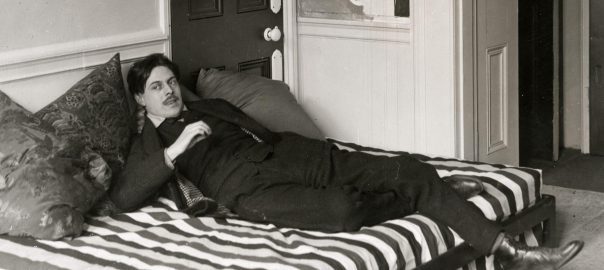Nathan Waddell, University of Birmingham
It may seem like the modernist painter and writer Wyndham Lewis (1882-1957) and Kanye West (the rapper and onetime presidential hopeful now known as Ye) have little in common. But their stories are connected: both are known for making controversial statements about the Nazis.
In 1931, Lewis published a sympathetic study of Adolf Hitler, who was then still on his way to power in Germany. Simply titled Hitler, his book was politically naive and casually antisemitic. Almost a century later, in late 2022, Ye made a sequence of antisemitic remarks, aligned himself with Hitler, praised Nazism and denied the Holocaust.
Both artists faced boycotts and public vilification. In the years after his Hitler book Lewis found himself, as he put it in his poem One-Way Song (1933), “not famous but infamous”. He started to suspect that readers were avoiding his books and that he had gained a reputation for disastrous thinking.
Ye similarly found himself in a storm. Business contracts and sponsorship deals were ended and he was suspended from Twitter after posting an image of a swastika entwined with a Star of David.
There are important differences between the two. Lewis wrote sympathetically about Adolf Hitler throughout the early 1930s, but a visit to Nazi Germany in 1937 made him re-evaluate his opinions. He became a committed anti-fascist, rejected Nazism in a book called The Hitler Cult (1939) and condemned the Holocaust as soon as he learned of it.
Unlike Lewis, who lived through the events as they unfolded, Ye aired his views in full knowledge of the Nazi legacy and presumably in full expectation of the response to his comments.
Cancellation before ‘cancel culture’
The different media landscapes in the 1930s and in the 2020s have shaped these artists’ respective backlashes. Due to the speed at which information circulates on social media, Ye’s vilification was instantaneous. Lewis’s shaming, by contrast, occurred over months and years.
There are also differences in motivation to consider. Ye’s remarks appear to be an offensive provocation. Lewis’s Hitler book was certainly provocative, but it wasn’t thoughtless. His priority, however misguided, was to give an “objective” hearing to political agendas that could in his view stop a second world war. On this front, Nazism temporarily seemed to Lewis like a realistic prospect.
If the idea of “cancellation” as we know it today had been available to him, Lewis would almost certainly have used it to describe the fallout from his Hitler book.
In seeking to purchase the social media platform Parler, Ye has moved to make himself and others who share his opinions “uncancellable”. Nevertheless, media outlets continue to report on the extent of the damage to his reputation – and his bank balance – through his “inappropriate behaviour”. To many, “cancelled” is precisely what Ye seems to be.
There is a difference, all the same, between being denied the chance to continue doing something – such as making money from a sponsorship deal or having a certain audience – and being denied the chance to do anything or to speak to anyone at all.
Denial in this sense is not “cancellation”, if by that word we mean a complete silencing of the person under fire. In being “cancelled”, those who are vilified for expressing ill judged or simply abhorrent views usually lose one kind of audience and gain another.
Lewis wasn’t cancelled in the sense of being stopped from doing anything. Despite the backlash to the Hitler book, he continued painting (and being esteemed for his painting) until he went blind in 1951 and he published books until his death. But he did suffer consequences for his opinions, even though he knew that he could transform controversy into an opportunity for PR.
An astute self promoter, Lewis used the Hitler “storm” to his advantage by capitalising in subsequent writings on the hullabaloo it generated. His career may in fact have been helped rather than hindered by it.
Ye may or may not be “uncancellable”, but as history shows there are profits to be made from scandal. If Ye’s remarks indicate his allegiance to far-right politics and if he intends to run again for public office, then planting the idea that he has been cancelled will aid his cause among a certain voter demographic. Cancellation, as Ye’s example indicates, can loop back on itself to become empowerment.
Comparing Lewis and Ye emphasises differences in scale and immediacy in cases of so called cancellation. It also demonstrates that being cancelled doesn’t mean being banished from, but being repositioned within the public sphere, sometimes at great personal cost.
Their controversies are a reminder that the right to be heard doesn’t automatically entail the right to go unchallenged.
Nathan Waddell, Associate Professor in Twentieth-Century Literature, University of Birmingham
This article is republished from The Conversation under a Creative Commons license. Read the original article.

